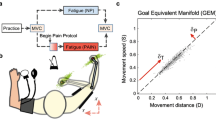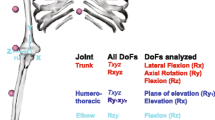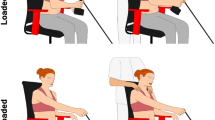Abstract
Fatigue arises during everyday activities, diminishes movement performance, and increases injury risk. Physical (PE) and cognitive exertion (CE) can induce similar feelings of fatigue, but it is not clear whether these also similarly affect movement performance. Therefore, this study examined the influence of PE and CE on anticipatory postural adjustments (APAs) of trunk muscles, which are feedforward mechanisms that contribute to motor control and controlled movement. Rapid arm movement tasks (RAM) were used to induce APAs of the trunk muscles prior and following three experimental conditions in 20 healthy adults: seated rest without exertion (NE), a combined isometric modified Biering–Sörensen and static abdominal curl to induce PE, and a modified incongruent Stroop colour-word task to induce CE. Fatigue was assessed using self-reported measures, and APA onset latencies of the trunk muscles with surface electromyography. Statistical analyses revealed that neither PE nor CE influence APAs of the trunk. Therefore, it is hypothesized that the influence of fatigue on movement performance might not be through altered motor control, but rather by reduced motivation. However, the possibility that fatigue might influence other mechanisms which contribute to trunk motor control, such as APA amplitude and variability, cannot be excluded and need further examination.


Similar content being viewed by others
References
Abd-Elfattah HM, Abdelazeim FH, Elshennawy S (2015) Physical and cognitive consequences of fatigue: a review. J Adv Res 6:351–358. https://doi.org/10.1016/j.jare.2015.01.011
Achttien RJ, Staal JB, Merry AHH (2011) KNGF-richtlijn Hartrevalidatie. Koninklijk Nederlands Genootschap voor Fysiotherapie, Amersfoort
Allison GT, Henry SM (2001) Trunk muscle fatigue during a back extension task in standing. Man Ther 6:221–228. https://doi.org/10.1054/math.2001.0412
Allison GT, Henry SM (2002) The influence of fatigue on trunk muscle responses to sudden arm movements, a pilot study. Clin Biomech (Bristol, Avon) 17:414–417. https://doi.org/10.1016/S0268-0033(02)00029-3
Ament W, Verkerke GJ (2009) Exercise and fatigue. Sports Med 39:389–422. https://doi.org/10.2165/00007256-200939050-00005
Asplund CL, Chee MW (2013) Time-on-task and sleep deprivation effects are evidenced in overlapping brain areas. Neuroimage 82:326–335. https://doi.org/10.1016/j.neuroimage.2013.05.119
Bartuzi P, Roman-Liu D (2014) Assessment of muscle load and fatigue with the usage of frequency and time-frequency analysis of the EMG signal. Acta Bioeng Biomech 16:31–39
Bisson EJ, McEwen D, Lajoie Y, Bilodeau M (2011) Effects of ankle and hip muscle fatigue on postural sway and attentional demands during unipedal stance. Gait Posture 33:83-87. https://doi.org/10.1016/j.gaitpost.2010.10.001
Boksem MA, Tops M (2008) Mental fatigue: costs and benefits. Brain Res Rev 59:125–139. https://doi.org/10.1016/j.brainresrev.2008.07.001
Booth M (2000) Assessment of physical activity: an international perspective. Res Q Exerc Sport 71:S114–S120
Borg GA (1982) Psychophysical bases of perceived exertion. Med Sci Sports Exerc 14:377–381
Borg G (1998) Borg’s perceived exertion and pain scales. Champaign
Borghuis AJ, Lemmink KA, Hof AL (2011) Core muscle response times and postural reactions in soccer players and nonplayers. Med Sci Sports Exerc 43:108–114. https://doi.org/10.1249/MSS.0b013e3181e93492
Boucher JA, Preuss R, Henry SM, Nugent M, Lariviere C (2018) Trunk postural adjustments: medium-term reliability and correlation with changes of clinical outcomes following an 8-week lumbar stabilization exercise program. J Electromyogr Kinesiol 41:66–76. https://doi.org/10.1016/j.jelekin.2018.04.006
Bouisset S, Zattara M (1987) Biomechanical study of the programming of anticipatory postural adjustments associated with voluntary movement. J Biomech 20:735–742. https://doi.org/10.1016/0021-9290(87)90052-2
Brauer SG, Burns YR (2002) The influence of preparedness on rapid stepping in young and older adults. Clin Rehabil 16:741–748. https://doi.org/10.1191/0269215502cr548oa
Budini F, Lowery M, Durbaba R, De Vito G (2014) Effect of mental fatigue on induced tremor in human knee extensors. J Electromyogr Kinesiol 24:412–418. https://doi.org/10.1016/j.jelekin.2014.02.003
Cavallari P, Bolzoni F, Bruttini C, Esposti R (2016) The organization and control of intra-limb anticipatory postural adjustments and their role in movement performance. Front Hum Neurosci 10:525. https://doi.org/10.3389/fnhum.2016.00525
Cholewicki J, Silfies SP, Shah RA, Greene HS, Reeves NP, Alvi K, Goldberg B (2005) Delayed trunk muscle reflex responses increase the risk of low back injuries. Spine (Phila Pa 1976) 30:2614–2620
Cohen J (1988) Statistical power analysis for the behavioral sciences. Routledge Academic, New York
Coorevits P, Danneels L, Cambier D, Ramon H, Vanderstraeten G (2008) Assessment of the validity of the Biering-Sorensen test for measuring back muscle fatigue based on EMG median frequency characteristics of back and hip muscles. J Electromyogr Kinesiol 18:997–1005. https://doi.org/10.1016/j.jelekin.2007.10.012
Corbeil P, Blouin JS, Begin F, Nougier V, Teasdale N (2003) Perturbation of the postural control system induced by muscular fatigue. Gait Posture 18:92–100. https://doi.org/10.1016/S0966-6362(02)00198-4
Craig CL, Marshall AL, Sjostrom M et al (2003) International physical activity questionnaire: 12-country reliability and validity. Med Sci Sports Exerc 35:1381–1395. https://doi.org/10.1249/01.MSS.0000078924.61453.FB
Danneels LA, Cagnie BJ, Cools AM, Vanderstraeten GG, Cambier DC, Witvrouw EE, De Cuyper HJ (2001a) Intra-operator and inter-operator reliability of surface electromyography in the clinical evaluation of back muscles. Man Ther 6:145–153. https://doi.org/10.1054/math.2001.0396
Danneels LA, Vanderstraeten GG, Cambier DC, Witvrouw EE, Stevens VK, De Cuyper HJ (2001b) A functional subdivision of hip, abdominal, and back muscles during asymmetric lifting. Spine (Phila Pa 1976) 26:E114–121
Danneels LA, Coorevits PL, Cools AM, Vanderstraeten GG, Cambier DC, Witvrouw EE, De CH (2002) Differences in electromyographic activity in the multifidus muscle and the iliocostalis lumborum between healthy subjects and patients with sub-acute and chronic low back pain. Eur Spine J 11:13–19. https://doi.org/10.1007/s005860100314
de Groot MH (1992) Psychometrische aspecten van een stemmingsschaal (Verkorte POMS) [Psychometric characteristics of a mood states inventory: shortened POMS]. Gedrag & Gezondheid: Tijdschrift voor Psychologie en Gezondheid 20:46–51
Dupeyron A, Perrey S, Micallef JP, Pelissier J (2010) Influence of back muscle fatigue on lumbar reflex adaptation during sudden external force perturbations. J Electromyogr Kinesiol 20:426–432. https://doi.org/10.1016/j.jelekin.2009.05.004
Enoka RM, Duchateau J (2016) Translating Fatigue to Human Performance. Med Sci Sports Exerc 48:2228–2238. https://doi.org/10.1249/mss.0000000000000929
Enoka RM, Stuart DG (1992) Neurobiology of muscle fatigue. J Appl Physiol (1985) 72:1631–1648. https://doi.org/10.1152/jappl.1992.72.5.1631
Feuerstein M, Carter RL, Papciak AS (1987) A prospective analysis of stress and fatigue in recurrent low back pain. Pain 31:333–344. https://doi.org/10.1016/0304-3959(87)90162-X
Gandevia SC (2001) Spinal and supraspinal factors in human muscle fatigue. Physiol Rev 81:1725–1789
Goel VK, Kong W, Han JS, Weinstein JN, Gilbertson LG (1993) A combined finite element and optimization investigation of lumbar spine mechanics with and without muscles. Spine (Phila Pa 1976) 18:1531–1541
Grinband J, Savitskaya J, Wager TD, Teichert T, Ferrera VP, Hirsch J (2011) The dorsal medial frontal cortex is sensitive to time on task, not response conflict or error likelihood. Neuroimage 57:303–311. https://doi.org/10.1016/j.neuroimage.2010.12.027
The IPAQ Group (2005) Guidelines for Data Processing and Analysis of the International Physical Activity Questionnaire (IPAQ): Short and Long Forms. https://sites.google.com/site/theipaq/scoring-protocol. Accessed 14 July 2016
Hedayati R, Kahrizi S, Parnianpour M, Bahrami F, Kazemnejad A (2010) The study of the variability of anticipatory postural adjustments in recurrent non-specific LBP Patients. World Acad Sci Eng Technol 4:735–738. https://doi.org/10.3233/BMR-130416
Hodges PW, Bui BH (1996) A comparison of computer-based methods for the determination of onset of muscle contraction using electromyography. Electroencephalogr Clin Neurophysiol 101:511–519
Hodges PW, Richardson CA (1997) Feedforward contraction of transversus abdominis is not influenced by the direction of arm movement. Exp Brain Res 114:362–370. https://doi.org/10.1007/PL00005644
Hodges PW, Richardson CA (1998) Delayed postural contraction of transversus abdominis in low back pain associated with movement of the lower limb. J Spinal Disord 11:46–56
Hwang JH, Lee YT, Park DS, Kwon TK (2008) Age affects the latency of the erector spinae response to sudden loading. Clin Biomech (Bristol, Avon) 23:23–29. https://doi.org/10.1016/j.clinbiomech.2007.09.002
Jacobs JV, Henry SM, Nagle KJ (2009) People with chronic low back pain exhibit decreased variability in the timing of their anticipatory postural adjustments. Behav Neurosci 123:455–458. https://doi.org/10.1037/a0014479
Jacobs JV, Henry SM, Nagle KJ (2010) Low back pain associates with altered activity of the cerebral cortex prior to arm movements that require postural adjustment. Clin Neurophysiol 121:431–440. https://doi.org/10.1016/j.clinph.2009.11.076
Johnston J, Rearick M, Slobounov S (2001) Movement-related cortical potentials associated with progressive muscle fatigue in a grasping task. Clin Neurophysiol 112:68–77. https://doi.org/10.1016/S1388-2457(00)00452-1
Kaigle AM, Holm SH, Hansson TH (1995) Experimental instability in the lumbar spine. Spine (Phila Pa 1976) 20:421–430
Kanekar N, Aruin AS (2014) The effect of aging on anticipatory postural control. Exp Brain Res 232:1127–1136. https://doi.org/10.1007/s00221-014-3822-3
Kanekar N, Santos MJ, Aruin AS (2008) Anticipatory postural control following fatigue of postural and focal muscles. Clin Neurophysiol 119:2304–2313. https://doi.org/10.1016/j.clinph.2008.06.015
Knox MF, Chipchase LS, Schabrun SM, Romero RJ, Marshall PWM (2018) Anticipatory and compensatory postural adjustments in people with low back pain: a systematic review and meta-analysis. Spine J 18:1934–1949. https://doi.org/10.1016/j.spinee.2018.06.008
Krishnan V, Aruin AS (2011) Postural control in response to a perturbation: role of vision and additional support. Exp Brain Res 212:385–397. https://doi.org/10.1007/s00221-011-2738-4
Krupp LB, LaRocca NG, Muir-Nash J, Steinberg AD (1989) The fatigue severity scale. Application to patients with multiple sclerosis and systemic lupus erythematosus. Arch Neurol 46:1121–1123
Lim J, Wu WC, Wang J, Detre JA, Dinges DF, Rao H (2010) Imaging brain fatigue from sustained mental workload: an ASL perfusion study of the time-on-task effect. Neuroimage 49:3426–3435. https://doi.org/10.1016/j.neuroimage.2009.11.020
Liu WY, Lin YH, Lien HY, Hsu LY, Tsai YJ, Liao CF, Tang SF (2015) Within-session acquisition of anticipatory postural adjustments during forward reaching task. Clin Neurol Neurosurg 129(Suppl 1):S53–S57. https://doi.org/10.1016/s0303-8467(15)30013-5
Lorist MM, Kernell D, Meijman TF, Zijdewind I (2002) Motor fatigue and cognitive task performance in humans. J Physiol 545:313–319
MacDonald D, Moseley GL, Hodges PW (2009) Why do some patients keep hurting their back? Evidence of ongoing back muscle dysfunction during remission from recurrent back pain. Pain 142:183–188. https://doi.org/10.1016/j.pain.2008.12.002
Macintosh JE, Bogduk N (1987) 1987 Volvo award in basic science. The morphology of the lumbar erector spinae. Spine (Phila Pa 1976) 12:658–668. https://doi.org/10.1097/00007632-198709000-00004
Macintosh B, Phillip G, Alan M (2006) Skeletal muscle: form and function. Champaign
Marcora SM, Staiano W, Manning V (2009) Mental fatigue impairs physical performance in humans. J Appl Physiol (1985) 106:857–864. https://doi.org/10.1152/japplphysiol.91324.2008
Marshall P, Murphy B (2003) The validity and reliability of surface EMG to assess the neuromuscular response of the abdominal muscles to rapid limb movement. J Electromyogr Kinesiol 13:477–489. https://doi.org/10.1016/S1050-6411(03)00027-0
Marshall PW, Murphy BA (2008) Muscle activation changes after exercise rehabilitation for chronic low back pain. Arch Phys Med Rehabil 89:1305–1313. https://doi.org/10.1016/j.apmr.2007.11.051
Marshall PW, Romero R, Brooks C (2014) Pain reported during prolonged standing is associated with reduced anticipatory postural adjustments of the deep abdominals. Exp Brain Res 232:3515–3524. https://doi.org/10.1007/s00221-014-4040-8
Massion J (1992) Movement, posture and equilibrium: interaction and coordination. Prog Neurobiol 38:35–56. https://doi.org/10.1016/0301-0082(92)90034-C
Mawston GA, McNair PJ, Boocock MG (2007) The effects of prior warning and lifting-induced fatigue on trunk muscle and postural responses to sudden loading during manual handling. Ergonomics 50:2157–2170. https://doi.org/10.1080/00140130701510139
Mehta RK, Agnew MJ (2011) Effects of concurrent physical and mental demands for a short duration static task. Int J Ind Ergon 41:488–493. https://doi.org/10.1016/j.ergon.2011.04.005
Mehta RK, Agnew MJ (2012) Influence of mental workload on muscle endurance, fatigue, and recovery during intermittent static work. Eur J Appl Physiol 112:2891–2902. https://doi.org/10.1007/s00421-011-2264-x
Monjo F, Forestier N (2015) Electrically-induced muscle fatigue affects feedforward mechanisms of control. Clin Neurophysiol 126:1607–1616. https://doi.org/10.1016/j.clinph.2014.10.218
Morris S, Allison G (2011) Core promises-the “transvers us feed forward corset” hypothesis in spinal stability explained by the push-throw motor control continuum? Physiotherapy (United Kingdom) 97:eS53–eS54
Morrison S, Kavanagh J, Obst SJ, Irwin J, Haseler LJ (2005) The effects of unilateral muscle fatigue on bilateral physiological tremor. Exp Brain Res 167:609–621. https://doi.org/10.1007/s00221-005-0050-x
Muller T, Apps MAJ (2018) Motivational fatigue: a neurocognitive framework for the impact of effortful exertion on subsequent motivation. Neuropsychologia. https://doi.org/10.1016/j.neuropsychologia.2018.04.030
Ng JK, Kippers V, Richardson CA (1998) Muscle fibre orientation of abdominal muscles and suggested surface EMG electrode positions. Electromyogr Clin Neurophysiol 38:51–58
Pageaux B, Marcora SM, Lepers R (2013) Prolonged mental exertion does not alter neuromuscular function of the knee extensors. Med Sci Sports Exerc 45:2254–2264. https://doi.org/10.1249/MSS.0b013e31829b504a
Pageaux B, Marcora SM, Rozand V, Lepers R (2015) Mental fatigue induced by prolonged self-regulation does not exacerbate central fatigue during subsequent whole-body endurance exercise. Front Hum Neurosci 9:67. https://doi.org/10.3389/fnhum.2015.00067
Panjabi MM (1992) The stabilizing system of the spine. Part I. Function, dysfunction, adaptation, and enhancement. J Spinal Disord 5:383–389
Park RJ, Tsao H, Cresswell AG, Hodges PW (2014) Anticipatory postural activity of the deep trunk muscles differs between anatomical regions based on their mechanical advantage. Neuroscience 261:161–172. https://doi.org/10.1016/j.neuroscience.2013.12.037
Perry M, Dean S, Devan H (2016) The relationship between chronic low back pain and fatigue: a systematic review. Phys Therapy Rev 21:173–183
Sparto PJ, Parnianpour M, Barria EA, Jagadeesh JM (1999) Wavelet analysis of electromyography for back muscle fatigue detection during isokinetic constant-torque exertions. Spine (Phila Pa 1976) 24:1791–1798. https://doi.org/10.1097/00007632-199909010-00008
Stevens VK, Bouche KG, Mahieu NN, Cambier DC, Vanderstraeten GG, Danneels LA (2006) Reliability of a functional clinical test battery evaluating postural control, proprioception and trunk muscle activity. Am J Phys Med Rehabil 85:727–736. https://doi.org/10.1097/01.phm.0000233180.88299.f6
Stevens VK, Parlevliet TG, Coorevits PL, Mahieu NN, Bouche KG, Vanderstraeten GG, Danneels LA (2008) The effect of increasing resistance on trunk muscle activity during extension and flexion exercises on training devices. J Electromyogr Kinesiol 18:434–445. https://doi.org/10.1016/j.jelekin.2006.10.009
Strang AJ, Berg WP (2007) Fatigue-induced adaptive changes of anticipatory postural adjustments. Exp Brain Res 178:49–61. https://doi.org/10.1007/s00221-006-0710-5
Strang AJ, Choi HJ, Berg WP (2008) The effect of exhausting aerobic exercise on the timing of anticipatory postural adjustments. J Sports Med Phys Fitness 48:9–16
Strang AJ, Berg WP, Hieronymus M (2009) Fatigue-induced early onset of anticipatory postural adjustments in non-fatigued muscles: support for a centrally mediated adaptation. Exp Brain Res 197:245–254. https://doi.org/10.1007/s00221-009-1908-0
Van Damme B, Stevens V, Van Tiggelen D, Perneel C, Crombez G, Danneels L (2014) Performance based on sEMG activity is related to psychosocial components: differences between back and abdominal endurance tests. J Electromyogr Kinesiol 24:636–644. https://doi.org/10.1016/j.jelekin.2014.05.008
van der Fits IB, Klip AW, van Eykern LA, Hadders-Algra M (1998) Postural adjustments accompanying fast pointing movements in standing, sitting and lying adults. Exp Brain Res 120:202–216
van Dieen JH, Reeves NP, Kawchuk G, van Dillen L, Hodges PW (2018) Motor control changes in low-back pain: divergence in presentations and mechanisms. J Orthop Sports Phys Ther. https://doi.org/10.2519/jospt.2019.7917
van Poppel MNM, Paw CA, van Mechelen W (2004) Reproduceerbaarheid en validiteit van de Nederlandse versie van de International Physical Activity Questionnaire (IPAQ). Tijdschrift voor Gezondheidswetenschappen 82:457–462
Vercoulen JHMM, Swanink CMA, Fennis JFM, Galama JMD, Vandermeer JWM, Bleijenberg G (1994) Dimensional assessment of chronic fatigue syndrome. J Psychosom Res 38:383–392. https://doi.org/10.1016/0022-3999(94)90099-X
Vercoulen J, Alberts M, Bleijenberg G (1999) De checklist individuele spankracht (CIS). Gedragstherapie 32:131–136
Wald F (1884) De verkorte POMS. (Doct Thesis). University of Amsterdam
Wald FDM, Mellenbergh GJ (1990) De verkorte versie van de Nederlandse vertaling van de Profile of Mood States (POMS). Nederlands Tijdschrift voor de Psychologie en haar Grensgebieden. 45:86–90
Funding
This work was supported by the Special Research Fund/Bijzonder Onderzoeksfonds (BOF) at Ghent University with an interdisciplinary grant (grant number BOF14/IOP/067). Sophie Van Oosterwijck is a PhD researcher supported by a research project grant from the Research Foundation—Flanders (FWO) received by Lieven Danneels and Jessica Van Oosterwijck (Grant Number G0B3718N). Jessica Van Oosterwijck is a Postdoctoral Fellow funded by the Research Foundation—Flanders (FWO) (grant number 12L5616 N).
Author information
Authors and Affiliations
Corresponding author
Ethics declarations
Ethical approval
All procedures performed in this study were in accordance with the ethical standards of the institutional research committee (University Hospital Ghent/Ghent University) and with the 1964 Helsinki declaration and its later amendments or comparable ethical standards.
Informed consent
All participants provided signed informed consent.
Additional information
Publisher's Note
Springer Nature remains neutral with regard to jurisdictional claims in published maps and institutional affiliations.
Rights and permissions
About this article
Cite this article
Schouppe, S., Danneels, L., Van Damme, S. et al. Physical and cognitive exertion do not influence feedforward activation of the trunk muscles: a randomized crossover trial. Exp Brain Res 237, 3011–3021 (2019). https://doi.org/10.1007/s00221-019-05585-0
Received:
Accepted:
Published:
Issue Date:
DOI: https://doi.org/10.1007/s00221-019-05585-0




